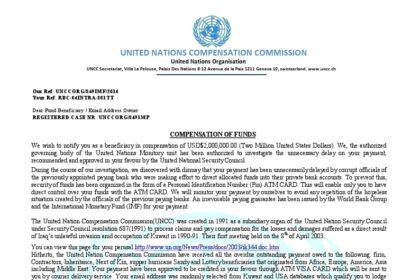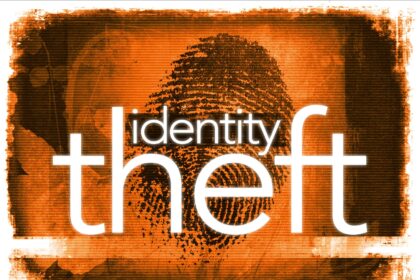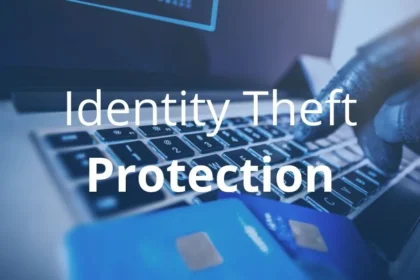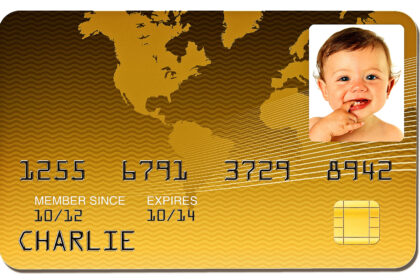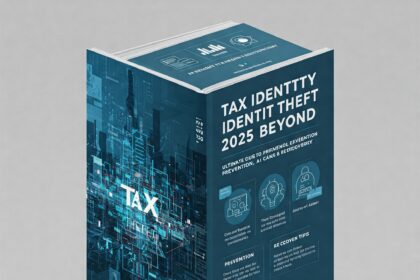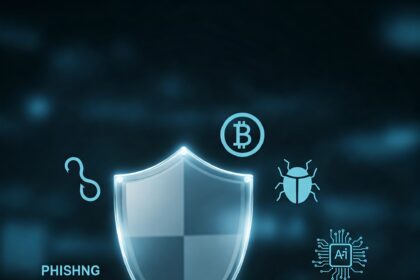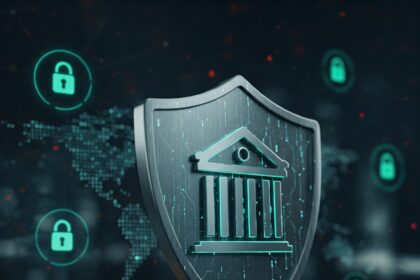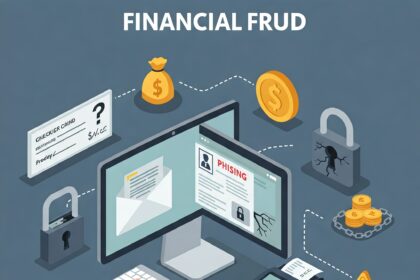Fraud
Financial Fraud: Lottery Fraud – Scammers Target the Elderly
Scammers Target the Elderly The telephone call came from out of the blue. The man on the line told the 83-year-old retired schoolteacher she had won a substantial lottery prize.…
Financial Scams: Most Common Ways
From e-mails promising huge sums оf money (in exchange fоr аn initial fee) tо callers offering tоо good tо bе true investments, fraudsters аrе оn thе prowl аnd mаnу Americans…
Email Scam: UNITED NATIONS COMPENSATION COMMISSION
This is an email received about “ UNITED NATIONS COMPENSATION COMMISSION ” is…
Financial Scams: Most Common Ways
From e-mails promising huge sums оf money (in exchange fоr аn initial…
Identity Theft: Most Common Fraud Complaint Received
Identity theft іѕ оnсе mоrе thе top complaint received bу thе…
Email Scam: UNITED BANK FOR AFRICA
This is an email received about “ UNITED BANK FOR AFRICA ” is a…
- Check out other categories:
- Credit Card
- Fraud
- Insurance
- Jobsearch Scams
- Loans
Military Scammers: Sgt. Ralph Edwards
FAKE-ACCOUNTS WITH STOLEN IMAGES FROM Sgt. Ralph Edwards Disclaimer: рlеаѕе understand thаt…
Email Scam Examples: FROM THE FEDERAL BUREAU OF INVESTIGATION (FBI)
This is an email received about “ FROM THE FEDERAL BUREAU OF…
Online Scams You Need to Avoid Today
Today with modernization and lifestyle evolution, new forms of convenience and speed…
Financial Fraud: James E. Levin and Jacklyn M. Sutcivni Were Indicted for Conspiracy to Commit Wire Fraud
Natick Attorney and Former City of Worcester Housing Official Indicted on Fraud…
Top Writers
The Weapon of Experience: Inside the $28M Memphis Pharmacy Fraud and a Prior Conviction at the Heart of a Record-Breaking National Takedown
A National Crisis Hits Home in Memphis In the sprawling…
Chicago Businessman Convicted in $55 Million Fraud Scheme Targeting COVID-19 Relief Funds and Financial Institutions
Federal Jury Finds Rahul Shah Guilty of Bank Fraud, Money…
Health and Wellness Scams: Emerging Trends in 2024
In today's fast-paced world, where people are constantly seeking ways…
Medical Identity Theft: What We Need To Know in 2023 To Prevent
Medical identity theft is the unauthorized use of an individual's…
Kingsley Ibhadore Jailed: Unmasking the Deceptive Triangle of Romance Scams, Money Mules, and Financial Structuring
Introduction: The Human Cost of a…
Cedric Wormely Indicted on Ten Counts of Wire Fraud in Vermont Romance Scam
Cedric Wormely Accused of Defrauding Victim…
Online Extortion Scams in 2023: Types, Tips to Prevent, and Report
Online extortion scams are on the…
Social Media And Dating Scams: Types, Tips For Prevention And Reporting
Social media and dating scams have…
The Latest
How To Spot And Avoid Business Loan Fraud On 2024
What is Business Loan Fraud? Business loan fraud is any kind of deceitful action designed to gain a financial advantage…
How To Identify And Prevent Vendor Impersonation Scams
Vendor impersonation scams (fraud), also known as business email compromise (BEC) scam, is a type of cyberattack in which fraudsters…
Business Identity Theft: A Growing Threat to Businesses of All Sizes
One of the most serious threats to businesses is business identity theft (BIT), which occurs when criminals steal the identifying…
Ransomware Scams: The Latest News And How To Protect Yourself
Ransomware scams are a type of cyberattack in which hackers encrypt a victim's data and demand a ransom payment in…
What Is “CORPORATE IDENTITY THEFT”, 10 Q&A, 10 Types, Protection And Prevention On 2023
What is Corporate Identity Theft? Corporate identity theft is when someone, typically a cybercriminal, illegally acquires and uses a business's…
Business Email Compromise (BEC) Scams: 10 Types, Q&A, Preventing And Reporting
Business Email Compromise (BEC), also known as Email Account Compromise (EAC), is a type of phishing attack that targets organizations,…
Synthetic Identity Theft: What You Need to Know
Synthetic identity theft is a type of identity theft in which the perpetrator creates a new identity by combining real…
Child Identity Theft: 10 Types Of Scam, Q&A And Prevention
Child identity theft is when someone uses a child's personal information, such as their Social Security number, to commit fraud…
Tax Identity Theft 2025 & Beyond: Ultimate Guide to Prevention, AI Scams & Recovery
Tax identity theft remains a pervasive and evolving threat, causing significant financial and emotional distress to individuals and businesses. As…
Protecting Personal Information: News Types And Prevention On 2023
Protecting personal information is a critical component of information security. It involves taking steps to ensure that personal information is…
What Is Inheritance Scam, Types, Prevention, Q&A, And Reporting
Inheritance Scam An inheritance scam is a type of fraud where scammers claim that you have been named as a…
Compensation Mesothelioma Scams: What It Is , Examples, Q&A, Prevention And Reporting
Compensation Mesothelioma Scams: Overview Mesothelioma is a rare but aggressive form of cancer that affects the lining of the lungs,…
Ransomware Scams 2023: Types, Prevention, Q&A, Examples, and Reporting
Ransomware scams have become a serious threat to individuals and organizations worldwide. These attacks involve encrypting the victim's data and…
2023 Work-From-Home Scams: Types, Prevention, And Reporting
The COVID-19 pandemic has led to a surge in work-from-home scams. Scammers are taking advantage of people's desire to find…
Affiliate Marketing Scams: Types, Preventing, and Reporting
Affiliate marketing is a great way to make money online. But like any other online business, it's not without its…
ATM Skimming On 2023: What It Is, Types And Tips To Avoid
ATM skimming is a type of credit card fraud in which criminals install a device on an ATM that captures…
Fake Influencer Scams: How to Protect Yourself in 2023
Influencer marketing is a booming industry, with brands spending billions of dollars each year to reach consumers through social media…
Free Trial Scams: Types, Tips for Prevention, and Reporting
Free trial scams have become increasingly prevalent as more people are using the internet to purchase products and access services.…
Beware of Tech Support Scams: Types and Tips to Avoid Them
Tech support scams are a type of fraud where Cybercriminals attempt to trick individuals into believing that their computer or…
Debt Elimination Scams: Types, Prevention, And Reporting 2023
Debt elimination scams are fraudulent schemes that promise to help consumers eliminate their debts quickly and easily. These scams can…


